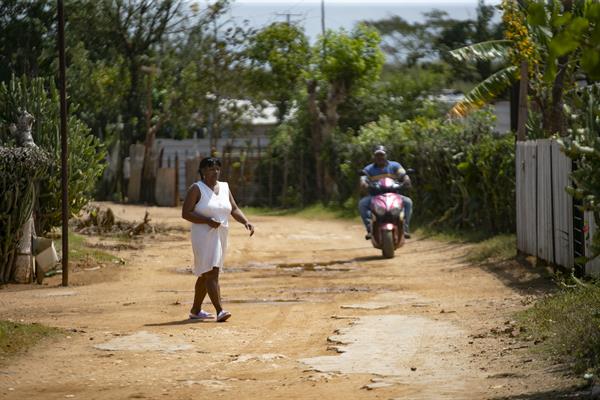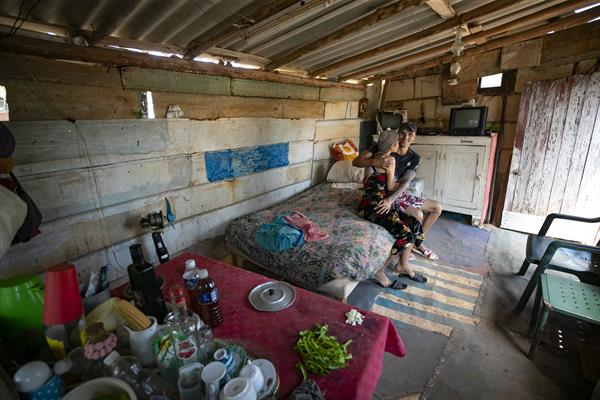In the darkness of her house, Catalina (35) questions the problems of her everyday life, similar to those suffered by millions of people in Cuba due to the serious economic crisis in which the country is suffering and which has sparked protests in several cities in recent days.
“There is no bread, no milk. We don’t have the strength. “The children don’t go to school because they don’t have breakfast, and when they go, they walk up to three kilometers because there is no transport…”, she tells EFE while her husband Víctor, 49, just nods with a lost look.
He says that he once asked his employer to let him go home because, in the heat, fainting that lasts more than ten hours and other difficulties, staying awake is a challenge: “I’m leaving because I’m sleepy, I’m tired (…) This is hard, very hard.”
The couple lives in Pure and Clean, a modest slum town near the city of Santa Marta (western Cuba).
EFE spoke with them a week before – and in four other municipalities on the island – Protests were held this Sunday, some with hundreds of people, shouting “Food and electricity!”, but also “Freedom!” and “Motherland and life!”
For Catalina and Víctor, as well as for their neighbors, life has become increasingly difficult over the past three years.
The pandemic, US sanctions and errors in national economic and monetary policy exacerbated the structural problems of the Cuban system and generated shortages of basic goods (food, medicine, fuel) and power outages, as well as inflation, mass migration and social unrest.
Food shortage
After the collapse of its agriculture, Cuba imports 80% of the food it consumes. And the lack of foreign exchange from the state made that job more and more complicated.
The supply in the bodegas (state subsidized basic goods stores), where you can only buy what corresponds to the supply book (ration card), is getting smaller and there are frequent delays in the delivery of rice, sugar or coffee.
On the other hand, in the initial private sector (import) products are priced beyond the means of the vast majority of Cubans, such as Catalina and Víctor.
The government noticed that during March there would be problems in complying with the distribution of bread through the booklet, and requested the help of the World Food Program (WFP) so that it could continue with the distribution of subsidized milk to minors.
Adjustment plan
To turn the economy around – still below 2019 levels and expected to sign off on its fifth consecutive year with a large fiscal deficit – the executive branch is implementing a tough adjustment plan.
The program includes a 400 percent increase in the price of gasoline, which took effect on March 1, and an increase in services such as water and electricity. This predicts more hardship for the average citizen and higher inflation.
Official market prices in February amounted to 32.08%, after closing 2023 and 2022 above 30%, and in 2021 at more than 77%. The increases in the informal market are even higher and have greatly eroded the purchasing power of the paltry government salaries.
Electric crisis
Adding to these problems is the inability of the power system to produce the energy needed by the country due to plant breakdowns and fuel shortages. Since February, between 20 and 45% of the island goes dark every day during peak demand.
The power outage, which lasts more than ten hours a day in many provinces, is an ordeal for many and a trigger – apart from other deep causes – of protests like those of last Sunday.
Sitting in front of his house, behind a narrow corridor, Felipe Miranda, a 57-year-old resident of Santa Marta, complains to EFE that the annoyance of the lack of electricity is even greater because, in addition, power outages are unpredictable.
And it’s what makes the difference between being able to cook a meal for the day – in many modest homes the kitchens are electric – or going hungry. “This is about running and working when there is,” he claims.
Already at night, after more than 10 hours of unconsciousness, Catalina is pained by what this causes in children like her: “We adults manage as we know how, but what about the children? Heavy”.
Source: Panama America
I am Amelia James, a passionate journalist with a deep-rooted interest in current affairs. I have more than five years of experience in the media industry, working both as an author and editor for 24 Instant News. My main focus lies in international news, particularly regional conflicts and political issues around the world.









